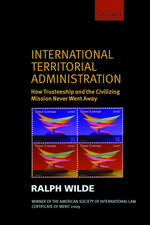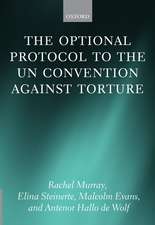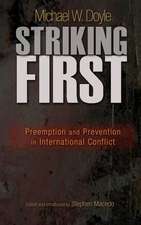The New World of UN Peace Operations: Learning to Build Peace?
Autor Thorsten Benner, Stephan Mergenthaler, Philipp Rotmannen Limba Engleză Hardback – 9 iun 2011
Preț: 759.19 lei
Preț vechi: 1091.76 lei
-30% Nou
Puncte Express: 1139
Preț estimativ în valută:
145.31€ • 149.75$ • 122.68£
145.31€ • 149.75$ • 122.68£
Carte tipărită la comandă
Livrare economică 21-27 februarie
Preluare comenzi: 021 569.72.76
Specificații
ISBN-13: 9780199594887
ISBN-10: 0199594880
Pagini: 262
Dimensiuni: 160 x 238 x 21 mm
Greutate: 0.52 kg
Ediția:New.
Editura: OUP OXFORD
Colecția OUP Oxford
Locul publicării:Oxford, United Kingdom
ISBN-10: 0199594880
Pagini: 262
Dimensiuni: 160 x 238 x 21 mm
Greutate: 0.52 kg
Ediția:New.
Editura: OUP OXFORD
Colecția OUP Oxford
Locul publicării:Oxford, United Kingdom
Notă biografică
Thorsten Benner's areas of expertise include international organizations (focusing on the United Nations), global security governance, EU foreign policy and EU-US relations in an emerging multipolar world as well as global energy and the public-private interface in global governance. Prior to co-founding the Global Public Policy Institute in 2003 (of which he is Associate Director) he worked with the German Council on Foreign Relations (DGAP), Berlin; the UN Development Program (UNDP), New York; and the Global Public Policy Project, Washington D.C. His commentary has appeared in DIE ZEIT, the International Herald Tribune, the L.A. Times,Handelsblatt, the Süddeutsche Zeitung, Financial Times Deutschland and the Neue Zürcher Zeitung, among others. He teaches in the Executive Master of Public Management (EMPM) and Master of Public Policy (MPP) programs at the Hertie School of Governance.Philipp Rotmann's research interests include global security governance and conflict management, in particular the interface of military force, policing and the rule of law in peace operations and counterinsurgency. He is a Fellow with the Global Public Policy Institute, Berlin, and serves until May 2011 as a Senior Strategy Analyst with the Office of the Senior Civilian Representative at ISAF Regional Command North in Mazar-e-Sharif, Afghanistan. In 2009, Philipp was briefly assigned to the German Federal Foreign Office at its Special Task Force on Afghanistan and Pakistan. Before joining GPPi as a Research Associate in 2005, he worked for the Organization for Security and Cooperation in Europe (OSCE) in Bosnia-Herzegovina. His commentary has been featured on the BBC, in the Financial Times Deutschland and in the International Herald Tribune, among others. He holds an MPA from the Harvard Kennedy School of Government.Stephan Mergenthaler's research interests comprise global security governance, EU foreign policy and EU-China relations. He is a fellow with GPPi and a project manager with the World Economic Forum. Prior to joining GPPi in 2007 Stephan Mergenthaler worked with the International Institute for Strategies Studies, London. He also gained experience with the American Enterprise Institute in Washington DC, the South Asia Human Rights Documentation Center in New Delhi, the German and French Ministries for Foreign Affairs in Berlin and Paris, and the German Mission to the UN, New York. His commentary has appeared in the International Herald Tribune, DIE ZEIT online, Spiegel online and EU Observer, among others. He holds an M.A. and M.Sc. from Sciences Po Paris and the London School of Economics.













